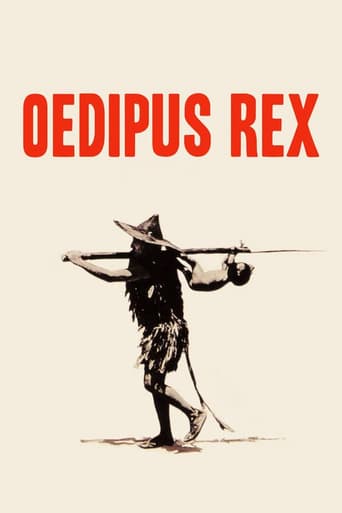Kirpianuscus
one of films who remands. the rules of Greek tragedy. the limits of interpretation. the manner to use the myth as contemporary mirror. the art of Piero della Francesca. the conflict between past and present. a film of actors. because each trace of acting defines not the vision of Pasolini about the fate of king from Thebes but its search of truth. the truth - basis of all. Edipo re impress. for atmosphere, for costumes and the use of myth.the eyes of Franco Citti. the presence of Silvana Mangano. the first scenes who are parts from a possible Visconti. the end as warning about the price of fight against yourself. Edipo re is support for reflection. not a new version of well known myth because the important details of myth are insignificant. not example of high art. because it is far to be a show. it is only exploration of meanings. and the sketch about different forms of pride and sacrifice. looking for authenticity. precise definition of life.
Fisher L. Forrest
I have heard some say this film, as far as it interprets the old legend, is "a piece of c***". I would not go that far, there are some good bits, but Pasolini's approach to telling a story on film is definitely not to my taste. The editing is rough, some of the actors just seem to walk through, like Silvana Mangano as Iocasta, others, like Pasolini himself as Oedipus seem in a constant manic state. You have to look fast to see Alida Valli as Merope, but her performance is the one I remember with the most pleasure. The camera work is unrelentingly stark to the point of boredom. And why, in the name of Pete, that modern "book-end" at the beginning and the end? No sense at all to it, unless Pasolini is trying to say "this is a story for all ages", but, heck, I already knew that.The story as Pasolini tells it follows Sophocles fairly well, with touches taken from Homer, but he doesn't mind going off on his own once in a while. If there is anyone who doesn't know the story, don't read any more until you have seen the film (there's an excellent DVD). In Sophocles, after Oedipus finally realises he has killed his father and fathered four children with his mother as his wife, he blinds himself. Pasolini leaves us there by going back to his modern conclusion. Actually, in the legend, his two daughters, Ismene and Antigone (subjects of another play by Sophocles) guide him on his way to Athens where he ultimately dies. I wish Pasolini had at least given us a glimpse of the girls and this journey. Oh, well, just call me a philistine who doesn't appreciate "real art".
Kara Dahl Russell
This film is possibly the most brilliant - color - film AS ART that I I have ever seen. It combines beautiful and fascinating poetic color visuals, unusual landscapes and locations with the classic story of Oedipus.The story is told with very little dialog, (subtitles for the dialog where present) and this enhances the internal, primal feeling of the piece. Pasolini was often compared to Fellini, but I feel he is much better, because he uses his visuals always to advance and to the purpose of the story. To me Fellini's visuals were often purposeless antic oddity. Here, any ambiguity is not in the story, but in character motivation, which lends modern reality and immediacy to the whole.The acting style combines the classic Greek use of stylized mannerisms and mask work seamlessly with smaller modern film acting. The setting transitions from 1960s Italy to a primitive/tribal landscape which lends itself beautifully to the timeless/ancient feeling of the Greek story. An example of detail: tribal body painting is used to represent both a ritual queen in shades of Elizabeth R, to the whiteness of a plague death; the costume designs are a combination of rustic and Egyptian/Papal religious.Cast mainly with little known actors, the big name actor in this film was international star Alida Valli, who has only two or three brief scenes. Her talent is fairly wasted here, but her presence is riveting as the aging, childless queen. (Valli: A brilliant Italian actress who had a brief career here in the 40s-50s, then returned to Italy/Europe, and balanced her commercial work in slashers with more oddball artistically challenging work. Her work often embodies "excess within control," the dichotomy of superficial clam with seething internal emotion. PARADINE CASE, THE THIRD MAN, THE MIRACLE OF THE BELLS, CASSANDRA CROSSING, EYES WITHOUT A FACE, SENSO, WALK SOFTLY STRANGER.) This film is the kind of work I would hope to be a part of as an actress and artist. This film could easily be in theatres today and be even more appreciated now than it was at the time of its making.Theatrically literate, visually stunning, gutsy, and intelligent. Enjoy!
butterfinger
Oedipus Rex: Oedipus Rex is a haunting experience. The final scene on the city streets is enchanting. The scene in which Oedipus kills three Roman guards is one of the finest tapestries of tension and viscera in cinema. The acting isn't worth mentioning; this film is Pasolini's triumph. It is mainly a triumph of striking and occasionally nauseating imagery. The shifts in time periods are rather tacky and simplistic in retrospect; they are done so gracefully though. The conclusion is pulled together with beautifully written dialogue that only Paolo Pasolini could deliver. The film is not one that is easily forgotten and is sure to be remembered for a long time.




